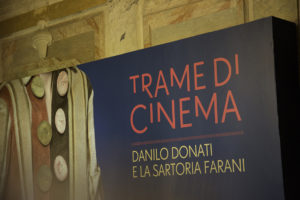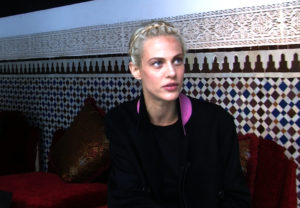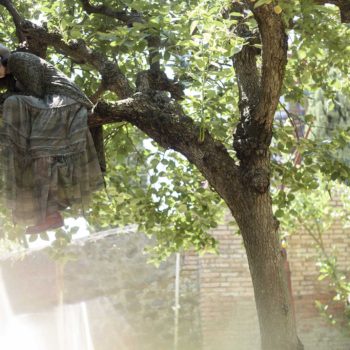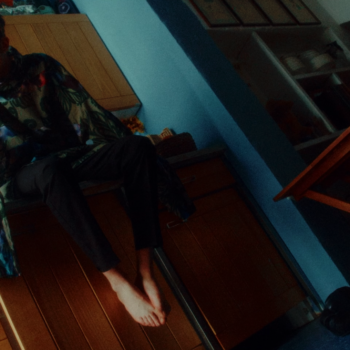by MONIKA NORWID
photography KARIM TIBARI
We look at each other from across the room. The room—actually a multi-tiered lobby of a grand hotel—is filled to Kardashian-wedding proportions with fragrant, sparkling, party-primed humans. If my photographer and I lose each other now, it may be hours, even days before we reconnect. But the room is also filled with food, and not politely along the sides or in some prim central spread, but indiscriminately, obscenely, everywhere I look and turn. Steppes of sushi and dunes of smoked salmon. Delicate Everests of desserts, exotic and classic alike. So many bar stations stocked with so much plastering potential that, for the first time at a packed party, I’m not worried that I won’t get a drink—I’m worried that I won’t stop getting drunker. I have to make a very fast, very difficult decision—work my way to the only person I know on this continent, or suppress my loneliness by working my way through yards of snacks. “Tough life,” you might be thinking sarcastically. You would be right.
Film festivals are actually hard work … usually. Actors are muscled by press campaigns to plug their latest showing, shuffled down a threadbare red carpet as if cattle-prodded from a remote location, with smiles so obligatory they twitch like tics. Directors are nervous and glum. Juries are bleary-eyed and bored (binge-watching under pressure isn’t as fun as you might think, especially when you’re asked to watch the very medium you spend your entire life behind the scenes of, making). And the press, in the ragged trenches of the red carpet—well, they’re in the trenches, and they’re weighed down with reviewer responsibility. What critics say about blockbusters doesn’t matter much, since it’s ultimately the Brad and Angelina of a mainstream film that sells it. But here at a festival, a critic’s opinion can make or break the chances of a small film to survive. Whether that film was selected to screen based on true merit or mere industry connections (or some cosmically charmed combination of the two) doesn’t matter so much as what one 500-word post on HollywoodReporter, IndieWire or HuffingtonPost has to say about it.
I truly understood the role of the press last night, when one of those outlet’s reporters literally spelled it out for me. Seated next to her at the opening ceremony of the festival, I chatted up the young woman to figure out what movies might be best to watch. The list of films in this year’s festival is a complete mystery to me, so I was hoping a pro could shed some light. But she, too, was unfamiliar with most of the films. That’s a good thing: there’s no prior hype to color her opinion. And hype is what these festivals are all about, for better or worse. When she first began her indie coverage for the web, the reviewer told me, she didn’t even know she could be the source of hype herself. Who cares about small movies anyway? But she quickly realized that, especially now with the reach of the internet, her writing has a big impact indeed. Has the awareness of her influence affected the way she writes reviews? I asked. Yes, she admitted. She tries not to review movies she doesn’t like. The effort that goes into completing a small film is itself such an act of devotion and courage that it’s hard for her to tear a small film down. She generally just opts to not write about it at all.
But right now, we are sitting in the nosebleed section of a huge auditorium, far above the struggles of the independent filmmaker, and far too from the usual crush of a regular film festival. (This is Marrakech, after all—the center of sensuality. If the earth had a g-spot, we’re in it. But more on that later.) Plush seats in dark velour rise like a tsunami wave around us, cresting over a half-moon stage framed in vivid, cheerful, Morocco-referencing set decorations. On the stage, there’s a strange white couch to one side, long as a minivan, looking as if it might unleash an orgy of psycho analysis. Above it, a screen is broadcasting the red carpet goings-on outside, live, and much, much larger than life. At first, the effect is eerie—like we’re on the surveillance side of a glorified security camera. But over time, it does the trick, building anticipation and feeding everyone’s reflexive celebrity fix—especially, I realize, as it only takes a minute for the giant-screen version of an actor to appear in person a few seats below me, albeit miniaturized by reality. With the exception of Jeremy Irons. He’s bigger in person, due both to a silky gait and a riveting style. (Yes, style can be riveting.)
“Sometimes you have to review films you don’t like,” the reporter says, interrupting my stalker-stare after Jeremy. For instance, a friend asked her to review his film. Begged her. She was reluctant. What if she didn’t like it? But her friend insisted. She relented. And, as was her greatest fear, she didn’t like it. Worst of all, she knew the backstory of the film. He’d spent ten years trying to make it. But that effort showed, and not in a good way. “Sometimes, you have to let things go,” she said, sad both for the film and for having to give her thumbs down to a friend. “Who you were when you wrote something ten years ago is not who you are today, and the results can be disjointed.”
She said some other fascinating things about her job, but I wasn’t paying enough attention to take them in. Jeremy Irons was wearing a long, brown house-coat-looking number, wrapped with a broad fabric belt, all this over a button-up shirt. He was saying hello to people, huge palms spread warmly around their shoulders, slow leans in for a kiss on both cheeks. That hair, flopping onto his brow. Yes, it does that in real life too.
Isabelle Huppert opened the ceremony in her signature demure style: a mere dust of sparkle on a grey, long-sleeve dress that was probably Armani, and that hair which always looks a little humidity-frizzed and seems to recall (or anticipate) a hysterical breakdown. She spoke briefly, but movingly, especially when referencing the late Daniel Toscan du Plantier, a French film producer and founder of the festival, and Yves Saint Laurent, whose ghost seems to haunt this town. The jury, including Alan Rickman, Bertrand Bonello and Cristian Mungiu, came out next, and when I say came out … there was a box that opened containing the first juror that made me think of something out of a mummy film. Once they were all assembled on stage to introduce the festival, each in their own language, the weird white couch was finally put to work—to my relief, merely as seating, and completely analysis-free.
The unusually festive jury introduction was then followed by a tribute to the Egyptian acting legend Adel Imam, who was met by a five minute standing ovation (when the clapping became rhythmic, he actually started sashaying and dancing). The man made me laugh out loud, even while speaking in Arabic—a language I don’t know—simply by the cadence and build up of his words and facial expressions. Those uncomprehending chortles alone speak volumes for his talent, both as an actor and as a kind of cultural emissary for the Arab film industry. “Many people tell me that their children learned Arabic from watching my films,” he confirmed, tearing up when thanking Morocco for honoring him. After the tribute, people in the audience hollered words of what I assume were adoration at him; always game, he would turn and flirt in their direction, a grin over his shoulder or a kiss flung wide with open arms.
The opening film was The Theory of Everything. I bawled through it—I guess you can take that as my version of two (very wet) thumbs up. Only the Brits can make arguably cheesy movie moments still dry enough to break into a jaded heart and set off the sprinklers.
The night ended at the party described above. It literally ended at the food: several plates of sushi, many handfuls of sweets, and meat roasted on an open fire were enough to knock out even the toughest of critics. And I’m one of the wimps.















